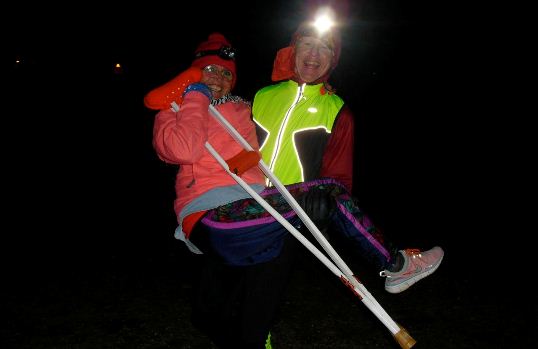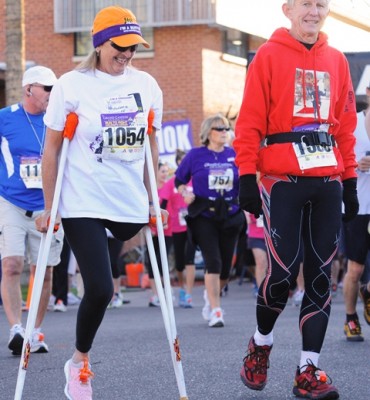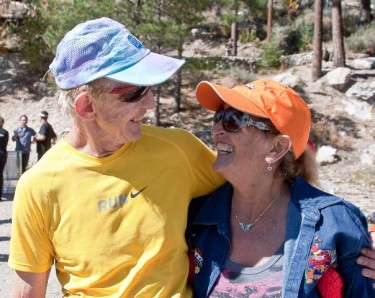By Michael Ferraresi
GCU News Bureau
The moment is similar at each race. Huguette White is hoisted into her boyfriend's arms. They cross the finish line together locked in a loving embrace, as if he were carrying her over a honeymoon threshold.
She says it feels like “joy overflowing,” almost as if she’s running alongside her romantic partner of 13 years.
White, who turns 75 in April, will participate in GCU’s March 9 Run to Fight Children’s Cancer with her boyfriend, Dan Brenden — an accomplished ultramarathon runner who competes regularly with White at his side for support. Early this year alone, he completed 120-plus-mile runs in Florida and Louisiana. But races that raise money or awareness for cancer causes are most important.
Nearly 60 years ago, White was given six months to live after doctors in her native Lebanon misdiagnosed her rare form of bone cancer. She was 15 when her mother brought her to a hospital in Oklahoma for a second opinion that led to the amputation that saved her life.
Since then, White found herself drawn to causes like the Run to Fight Children’s Cancer because she felt support and well-wishes from strangers helped her overcome childhood cancer. GCU’s 10K/5K race event raises money for the nonprofit Children’s Cancer Network and Phoenix Children’s Hospital, which work together to provide financial, emotional and educational support to families with children ranging from preschoolers to teens.
“I have so much feeling for them inside of me, I just ache for them,” said White, who lives with Brenden in Phoenix. “I feel what they’re going through. It means a lot to me to give something back for what’s been given to me.”
Before doctors identified her cancer in 1954, White complained — like many childhood leukemia patients — about what seemed like common aches and pains. But it soon grew worse. Her left leg hurt badly and she developed a lump above her knee. She felt numbness. But doctors in Lebanon initially shrugged it off as teenage growing pains.
It wasn’t until she made it to Oklahoma, where her grandparents lived, that doctors could properly treat her Ewing’s sarcoma. The uncommon form of cancer “may arise in immature nerve tissue in the bone marrow,” according to the U.S. Centers for Disease Control and Prevention.
| Run to Fight Children's Cancer | |
| For more information and to register for either of the races, go to the Run to Fight Children’s Cancer website at www.runtofightcancer.com. The site explains how to get involved with the cause and details on the races. Friend the race cause on Facebook at /runtofightchildrenscancer and follow it on Twitter @Run2Fight. |
White remembers facing the question of death. She wept as her mother translated the American doctors’ words into Arabic or French, the languages she grew up with in Lebanon. The cancer had built up over about one year. Amputating her leg was necessary to prevent the cancer from spreading.
She knew how sick she was and worried that she might die. But she fought through treatments, inspired by the flowers, stuffed animals and other gifts that ended up in her hospital rooms thanks to generous donations from strangers who heard about the Lebanese girl who fighting for her life.
In that spirit, GCU race organizers and participants say that Children’s Cancer Network could provide even more of an impact if the race meets its goal of raising $100,000.
“I was never told and I never asked, but I knew my parents couldn’t afford everything,” White said about the well-wishers who helped her when she was a teen.
“That’s why I have so much love now, and feel the way I feel. It lifted my spirits,” she said. “I said, ‘I don’t even know these people, why are they so good to me?’ It also lifted my mother’s spirits. … Sometimes cancer is tougher on the family.”
White and Brenden, who works in the civil division of the Maricopa County Attorney’s Office, learned about GCU’s Run to Fight Children’s Cancer when they came across a GCU table at the Fiesta Bowl half-marathon in Scottsdale a couple years ago. White got to know the cause. Now she and her inseparable running mate are linked to GCU through the mutual concern for childhood cancer patients.
“I wish it was me and not them,” White said. “I look at the kids from Children’s Cancer Network, and they have so much courage.”
White has also emerged as a symbol of hope for survivors. She fought off a recurrence of cancer following a car accident a few years after her leg was amputated, but has been cancer-free for more than 50 years.
Survival from childhood cancer is a very real possibility, according to doctors. Mitigating stress within a family helps recovery, however. Children’s Cancer Network helps families deal with the constant visits to Phoenix Children’s Hospital and other stresses.
“Patients that I took care of when they were 2 and 3 are now in their 30s, and they have families,” said Dr. Michael Etzl, clinical director for Phoenix Children’s Hospital’s Center for Cancer and Blood Disorders.
The work of Children’s Cancer Network helps patients, Etzl said, because volunteers who assist children at PCH are familiar with what families are going through.
“You can’t underestimate what that does for a family who, in many cases, is not just dealing with serious or life-threatening and sometimes fatal problems with the child,” Etzl said, “but also dealing with work, other expenses, other children... That’s what people don’t get to see.”
White said love and prayer help, as well.
And a little lift to the finish line.
Contact Michael Ferraresi at 639.7030 or [email protected].






































































